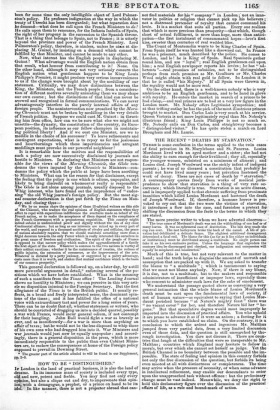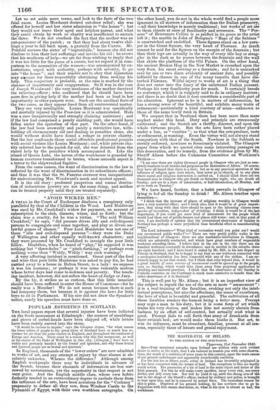THE RECENT " DEATHS BY STARVATION."
THERE is some confusion in the terms applied to the twin cases of fatal privation in St. Marylebone and St. Pancras. Louisa Mordaunt lived with an aged mother and a sister; she had not the ability to earn enough for their livelihood ; they all, especially the younger women, subsisted on a minimum of aliment ; and Louisa died. Joseph Woodward was the sickly infant of indigent parents ; he was of so diseased a constitution that probably he could not have lived many years ; but privation hastened -the work of decay. These are not cases of death by " starvation." A contemporary quotes freely from works of medical juris- prudence to show that starvation is a thing of very rare oc- currence ; which literally is true. Starvation is an acute disease, ' and is improperly applied to that chronic suffering from proximate inanition which killed Louisa Mordaunt and hastened the death of Joseph Woodward. If, therefore, a humane horror is pro- voked to cry out that the two were the victims of starvation, it introduces a flaw into the case, and furnishes a pretext for shifting the discussion from the facts to the terms in which they are stated.
The more precise writer to whom we have adverted observes-
" The tree cause of Mordannt's death was not the withholding of one loaf or of many loaves. It was no ephemeral case of destitution. The last drop made the cup run over. The last barleycorn broke the back of the camel. A life of pri- vation had debilitated a delicate frame. The slightest additional derangement , determined a fatal end. The blame for this (as far as it lies either on individuals or institutions) must be distributed among a multitude. No single person can take it as his own exclusive portion. Unless the language that engenders the contrary idea be discouraged and checked, our indignation and compassion will equally be misplaced and misdirected."
Much of this is true, but not very relevant to the matter in hand; and the truth helps to disguise the amount of untruth and assumption that are packed up with it. We arg asked to transfer the blame to " a multitude ' ; which is tantamount to saying that we must not blame anybody. Now, if there is any blame, it is due, not to a multitude, but to the makers and responsible administrators of insufficient or improper laws, especially those who consent to administer such laws for the sake of emolument.
We understand the passage quoted above as conveying a veig general intimation that the whole blame of Louisa Mordaunt's death must be cast upon the fundamental laws of society, if not of human nature—as equivalent to saying that Louisa Mor- daunt perished because "at Nature's mighty feast" there was " no vacant cover " for her, and therefore Nature bid her " be- gone." But that speculative dogma would most improperly be imported into the discussion of practical affairs. You who uphold it are prone to advance it as if it were an axiom ; a footing for it to which you have established no claim. On the contrary, it is a conclusion to which the ardent and ingenious Mr. Malthus jumped from very partial data, from a very limited discussion even of those data, and the question is still unsearched by tho- rough investigation. You dare not discuss it. There are coun- tries that laugh at the difficulties that were so insuperable to Mr. Malthus - countries which England may hesitate to follow in : morals, hut over which she cannot set herself as judge. Yet the British Channel is no boundary between the possible and the im- possible. The state of feeling and opinion in this country forbids not only the free discussion of the question, but forbids its being even mooted at all with distinctness or completeness. The time may arrive when the pressure of necessity, or when some advance in intellectual refinement, may enable our descendants to enter upon the unapproached task without offence : but the preliminary change must be vast indeed. Meanwhile, we deny the right to hold this declamatory figure over the discussion of the practical affairs of life, as a rule and bound-mark of action. -Let us set aside mere terms, and look to the facts of the two fatal cases. Louisa Mordaunt desired out-door relief; she was offered for herself and her sister admission to "the house " ; but they would not leave their aged and helpless parent, and what they could obtain by work or charity was insufficient to sustain the three. W e do not overlook the fact that the mother was an out-pensioner of the parish ; or that they had about twelve shil- lings a year to fall back upon, a gratuity from the Curate. Mr. Penfold accuses the sister of "ingratitude," because she did not disclose to him their last sufferings and invoke his aid : he avows that his modicum of help—we are far from wishing to imply that it was too little for the purse of a curate, but we regard it in com- parison to the necessities of the women—was accompanied by ex- hortations, urged with authority, perhaps with severity, to go into "the house " ; and their resolve not to obey that injunction may account for their respectfully abstaining from seeking his help. This conjecture is probable, as the case is marked by the absence of importunity and exaggeration. So it was in the case of Joseph Woodward : the very meekness of the mother deceived the relieving-officer ; who confessed that he should have been more free in giving help if the mother had been as loud in her importunity as other paupers were. Such are the cardinal facts of the two cases, as they appear freed from all controversial matter.
They are very intelligible. Louisa Mordaunt was specifically and mortally injured by the Poor-law as it is administered. Hers was a case unequivocally and strongly claiming assistance ; and if the law had comprised a purely enabling part, she would have fallen under the operation of that part. On the other hand, if the law had been avowedly and purely a restrictive law, with- holding all eleemosynary aid and dealing in penalties alone, she would without doubt have found a refuge in private charity. But the law confounds those social offenders professional paupers with social victims like Louisa Mordaunt ; and, while private cha- rity referred her to the parish for aid, she was deterred from the stated help by the penalties which accompanied it. Like the island of Queen Labe, the haven of the workhouse is guarded by human creatures transformed to brutes, whose uncouth aspect is a terror to the shipwrecked fugitive. From the same causes, the want of discrimination in the law is reflected by the want of discrimination in its subordinate officers ; and thus it was that the St. Pancras overseer was incapacitated for understanding Mrs. Woodward's meek and modest appeal.
It is the old story : professed pauperism and casual destitu- tion of industrious poverty are not the same thing, and neither can be treated properly until they are treated separately.



































 Previous page
Previous page